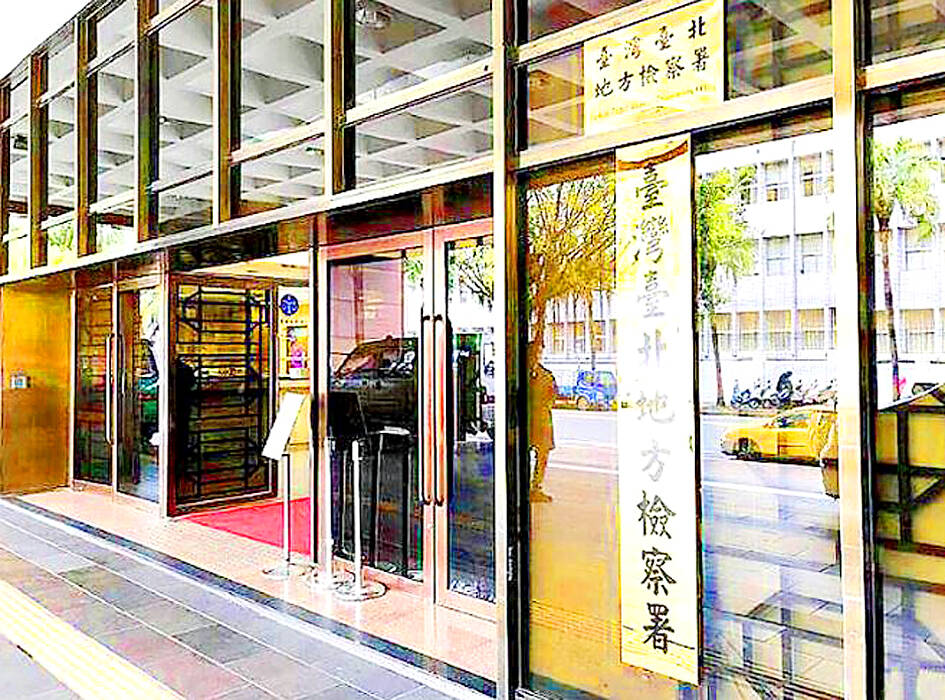A retired professor has been indicted on charges of fraud and forgery for allegedly using students’ information to receive money related to research projects during his tenure at National Taiwan University (NTU), the Taipei District Prosecutors’ Office said yesterday.
Huang Liang-hsiung (黃良雄) allegedly obtained millions of dollars in funding for university research projects by fraudulently listing the names of his students and their relatives as research assistants and employees, prosecutors said.
The research projects, which Huang either led or co-led, were commissioned by NTU, National Yang Ming Chiao Tung University — formerly National Chiao Tung University before its merger with National Yang-Ming University — and government agencies, prosecutors said.

Photo: Chien Li-chung, Taipei Times
Huang allegedly assigned a doctoral student surnamed Chang (張) to obtain personal and bank account information of Huang’s students and aides, who were then fraudulently listed on the projects as research assistants or temporary employees, they said.
Prosecutors said that Huang allegedly asked Chang to contact a person surnamed Chiu (邱) at a private company to issue invoices and quotations that were fraudulently used to claim more than NT$400,000 (US$12,547) in funding for research projects.
Huang made nearly NT$3.82 million from projects commissioned by the universities and government agencies from August 2009 to March 2019, prosecutors said.
Chang, Chiu and the individuals who consented to pose as Huang’s research assistants all confessed to unlawful practices and were granted deferred prosecution, prosecutors said.

The Chinese military has built landing bridge ships designed to expand its amphibious options for a potential assault on Taiwan, but their combat effectiveness is limited due to their high vulnerability, a defense expert said in an analysis published on Monday. Shen Ming-shih (沈明室), a research fellow at the Institute for National Defense and Security Research, said that the deployment of such vessels as part of the Chinese People’s Liberation Army (PLA) Navy’s East Sea Fleet signals a strong focus on Taiwan. However, the ships are highly vulnerable to precision strikes, which means they could be destroyed before they achieve their intended

The Taiwan Experience Education Program (TEEP) has funded short-term internships in Taiwan for more than 4,500 young people from more than 40 countries since 2015, with the goal of attracting and retaining international talent, the Ministry of Education said yesterday. Fifty-five colleges launched 514 projects this year, including in fields such as semiconductors, artificial intelligence, medicine and biotechnology, green energy, and sustainability, it said. The program provides research and practical internships in Taiwan for two to six months, and offers cultural exchange and networking opportunities, the ministry said. For example, National Formosa University’s Embedded System and Autopilot Laboratory developed two solar-powered drones in

GLOBAL: Although Matsu has limited capacity for large numbers of domestic tourists, it would be a great high-end destination for international travelers, an official said Lienchiang County’s (Matsu) unique landscape and Cold War history give it great potential to be marketed as a destination for international travelers, Tourism Administration Director General Chen Yu-hsiu (陳玉秀) said at the weekend. Tourism officials traveled to the outlying island for the Matsu Biennial, an art festival that started on Friday to celebrate Matsu’s culture, history and landscape. Travelers to Matsu, which lies about 190km northwest of Taipei, must fly or take the state-run New Taima passenger ship. However, flights are often canceled during fog season from April to June. Chen spoke about her vision to promote Matsu as a tourist attraction in

Taipei resident Mu Chu-hua caught some glimpses of China’s mighty military parade on YouTube on Wednesday. As she watched hypersonic missiles roll down Beijing’s Changan Avenue and troops march in lockstep, she did not feel like they posed a threat to Taiwan. Mu, a 69-year-old retiree, said she saw the parade as simply a way for Chinese President Xi Jinping (習近平) to “say thank you to the troops.” “I thought it was quite normal,” she said. “It was very cool.” China’s military parade commemorating the end of World War II was being watched internationally for insights into Beijing’s military advances and its show